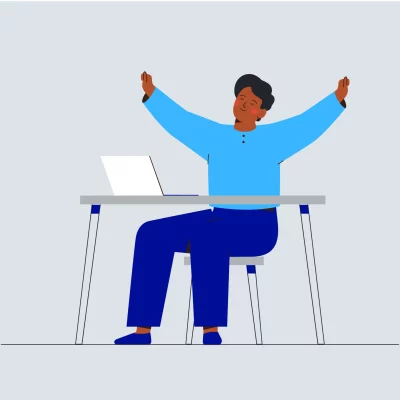Do you struggle with staying organized, managing time, and regulating emotions?
Do you feel disorganized or forgetful throughout your day, making it difficult to follow through with tasks or responsibilities?
If so, you may be experiencing challenges with executive functioning. But what exactly is executive functioning, and how can you improve these skills?
In this blog post, we’ll explore executive functioning, who may struggle with it, tips for enhancing executive function skills to help you thrive, and more.
What is Executive Functioning?
Executive functioning is like the CEO of your brain. It helps you plan, organize, prioritize, and execute tasks effectively.
According to Harvard University, “executive function” refers to a set of skills. When you have executive dysfunction, you have difficulty in one or more of the eight skills that encompass all of your executive functions.
The 8 Executive Functioning Skills are:
1. Inhibition: Controlling impulsive behaviors and thinking before acting.
2. Self-regulation: Monitoring and regulating your emotions, thoughts, and behaviors to achieve goals.
3. Emotional Control: Managing and expressing emotions appropriately in different situations.
4. Working Memory: Holding information in the mind and using it to complete tasks.
5. Planning and Prioritization: Setting goals, making a plan, and prioritizing tasks accordingly.
6. Task Initiation: Starting tasks without procrastinating or getting distracted.
7. Flexibility: Adaptability to changing circumstances and switching between tasks or strategies when needed.
8. Organization: Creating and maintaining systems to keep track of information and materials.
These skills are essential for everyday functioning, from getting ready in the morning to completing tasks at work or school. When one or more of these skills is impaired, it can lead to difficulties in various aspects of life.
Signs of executive dysfunction include:
-
- Difficulty starting or completing tasks
- Trouble focusing and staying on task
- Struggles with time management and meeting deadlines
- Forgetfulness and disorganization
- Becomes emotionally overwhelmed frequently
Although there are clear signs of this type of dysfunction, executive function is not a diagnosis. It’s a term that refers to weaknesses in the brain’s self-management system.
Those experiencing executive dysfunction may feel:
-
- Frustrated
- Disorganized
- Inconsistent in their abilities
- Low self-esteem
- Like they are fighting with themselves daily to get anything done
- Overwhelmed easily
- Impulsive
If you experience executive functioning issues, you may often think you are being lazy or have a lack of willpower to get things done. This belief perpetuates negative feelings that affect your self-esteem and motivation. It is important to remember that when you have difficulty accomplishing even simple tasks as a result of underdeveloped executive functioning skills, that is not laziness.
To understand why this happens, let’s dive into what causes executive dysfunction.
What Causes Executive Dysfunction?
Executive function skills develop over time and can be affected by various factors, such as genetics, environment, and life experiences. While some individuals may have naturally stronger executive functioning abilities, there are conditions that can cause you to have a weakened proficiency in these skills.
This type of dysfunction is often caused by a coexisting condition that disrupts your ability to regulate self-control and the execution of tasks.
Conditions that contribute to executive function include:
- ADHD
- Learning disabilities
- Autism
- Traumatic brain injury
ADHD and Learning Disabilities
In ADHD, difficulty with attention and hyperactivity can make it challenging for you to stay focused on tasks and follow through with plans. This can lead to poor time management and organization skills, and trouble regulating emotions and impulses.
Although many conditions contribute to executive functioning issues, if you have ADHD, you are more likely to experience these difficulties more severely than others.
Similarly, if you struggle with learning disabilities, you may struggle with processing information efficiently, impacting your ability to plan, prioritize, and manage time effectively. This can also contribute to frustration and low self-esteem if tasks take longer or don’t come as quickly as for you as they do for others.
Neurological Conditions: Autism and Traumatic Brain Injury
If you are diagnosed with autism, your executive dysfunction may be related to difficulties in social communication and flexibility. This can make it challenging for you to plan and adapt to changes in routine or expectations.
In traumatic brain injury (TBI) cases, damage to the frontal lobe of the brain, responsible for executive functioning, can cause changes in these skills. This can result in difficulties with planning, decision-making, and regulating emotions.
Will You Always Struggle With Executive Functions?
Executive function skills can improve with practice and guidance. While it is possible to continue to experience difficulties, you may find that your executive functioning improves as you learn strategies and techniques to overcome your challenges. How much you can improve is based on multiple factors, including but not limited to, diagnosis, an effective treatment plan, and how consistent you are with using strategies to strengthen your executive function over a long period of time to solidify new habits and new ways of thinking.
As with many mental health difficulties, executive function is best helped by using multiple treatments or techniques to grow strength in this skill set from numerous angles.
The treatment plan for Executive Functioning issues can include:
- Cognitive Behavioral Therapy (CBT)
- Time management strategies and tools
- Counseling, coaching, or tutoring depending on your needs
- Medication
Your counselor or doctor can offer personalized tips and strategies based on your unique struggles. They will assess your symptoms and ability to perform each skill and plan to increase your capabilities over time.
If you have ADHD or a condition like it, the outlook for growing this skill set is high, depending on having the right treatment plan for you and utilization of the tools in your daily life. As mentioned before, implementing these skills and seeing consistent growth may take time, but it is possible.
If you suffer with a condition like a TBI or Autism, the ability to grow in these skills is also possible. Still, it is much more dependent on your diagnosis. Speak to your counselor or doctor to learn more about improving these skills based on your condition.
How to Improve Your Executive Functioning Skills
Think of Executive Function as a muscle. To get stronger muscles, you need to work out and lift weights to increase your strength. Similarly, if you have an underdeveloped executive function, you need to exercise your skills to strengthen your ability to self-regulate emotions and focus on tasks even when distractions are happening around you.
Strengthening this skill set, like most important and worthwhile things, takes time. Some strategies need to be used and repeated over time to solidify a new automatic response to the situations and stimuli that overwhelm you.
The good news is that practice and specific strategies can improve executive function skills.
The 7 tips to improve Executive Function are:
1. Create a routine: Having a set schedule for daily tasks such as waking up, meals, and bedtime can help reduce decision-making fatigue and improve time management.
2. Use visual aids: Visual aids like calendars, to-do lists, or color-coded schedules can help with organization and planning.
3. Color code your things: Don’t feel bad if you have a favorite highlighter or prefer your post-its to be a particular color.
According to Gayle Gruenberg, a certified professional dealing with chronic disorganization, “The use of color can stimulate the under-stimulated pre-frontal cortex of someone with executive function challenges, engaging the person in an activity that would otherwise cause boredom, frustration, and avoidance.”
4. Break tasks into smaller steps: Large or complex tasks can be overwhelming, but breaking them down into smaller, more manageable steps can make them feel more achievable.
5. Practice self-care: Prioritizing self-care activities such as quality sleep and consistently reducing your overall stress level can help improve focus and your ability to regulate emotions.
6. Modify your environment: One of the best ways to help with executive function is to modify your environment to reduce the amount of self-regulation you need to do. This means doing things like putting away distractions and making time more visible.
7. Restore your resources: You have limited resources for your executive functions, and you use those resources every time you self-regulate. To restore some of these resources, you can take a break, have a snack, and drink water. Doing these things periodically throughout your day may extend your resources to handle other tasks better longer than you typically have in the past.
Practicing these strategies can help you grow significantly in your ability to regulate emotion, maintain focus, and get things done more efficiently over time.
Start implementing these tips today and see their positive impact on your daily life. Your CEO brain will thank you!
Need Help Improving Your Executive Function?
If you find that your executive functioning challenges significantly impact your daily life, seeking help from a professional counselor can guide you on how to function at a higher level. A counselor can work with you to develop personalized strategies and techniques for managing executive functioning difficulties.
Everyone’s brain is wired differently, and it’s okay if you struggle with specific tasks. You can improve your executive functioning skills and thrive in life with patience and practice.
For more guidance on finding the root cause of your difficulties with executive function and a personalized approach to increasing your ability to accomplish tasks and reach your goals, call us at (833)-274-heal or start here to get connected with a licensed counselor who understands your struggles.
You are meant to thrive, so start to overcome what is holding you back today.
Why ADHD Paralysis Makes Life Painfully Difficult & How To Overcome It








